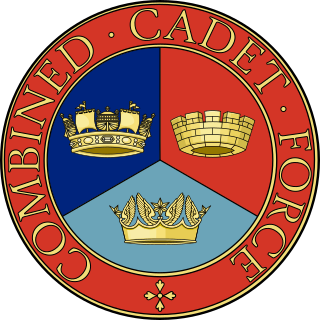
The Combined Cadet Force (CCF) is a youth organisation in the United Kingdom, sponsored by the Ministry of Defence (MOD), which operates in schools, sub divided into Royal Navy, Royal Marines, Army and Royal Air Force sections. Its aim is to "provide a disciplined organisation in a school so that pupils may develop powers of leadership by means of training to promote the qualities of responsibility, self reliance, resourcefulness, endurance and perseverance".
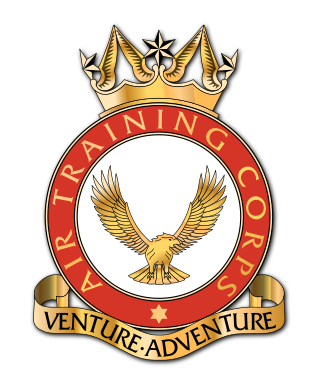
The Air Training Corps (ATC) is a British volunteer youth organisation of the United Kingdom; aligned to, and fostering the knowledge and learning of military values, primarily focussing on military aviation. Part of the Royal Air Force Air Cadets (RAFAC), the ATC is sponsored by the Royal Air Force (RAF) and the wider Ministry of Defence (MoD). The majority of Air Training Corps staff are volunteers, though some staff are paid for full-time work; including Commandant Air Cadets, who is a Royal Air Force officer as part of a Full Term Reserve Service commitment. In 2013, the officer in command (OIC) of the Air Training Corps was Air Commodore Dawn McCafferty.

The Army Cadet Force (ACF), generally shortened to Army Cadets, is a national youth organisation sponsored by the United Kingdom's Ministry of Defence and the British Army. Along with the Sea Cadet Corps and the Air Training Corps, the ACF make up the Community Cadet Forces. It is a separate organisation from the Combined Cadet Force which provides similar training within principally private schools.
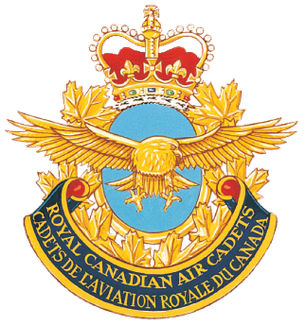
The Royal Canadian Air Cadets is a Canadian national youth program for young individuals aged 12 to 19. Under the authority of the National Defence Act, the program is administered by the Canadian Forces (CF) and funded through the Department of National Defence (DND). Additional support is provided by the civilian Air Cadet League of Canada (ACLC). Together with the Royal Canadian Sea Cadets and Royal Canadian Army Cadets, it forms the "largest federally funded youth program in the country". Cadets are not members of the military and are not obliged to join the Canadian Forces.
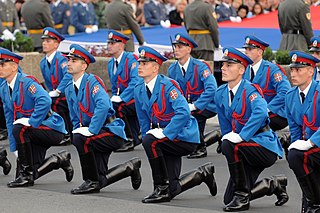
A cadet is an officer trainee or candidate. The term is frequently used to refer to those training to become an officer in the military or maritime sector, often a person who is a junior trainee. Its meaning may vary between countries which can include youths in voluntary youth organisations.

Canadian Forces Base Esquimalt is Canada's Pacific Coast naval base and home port to Maritime Forces Pacific and Joint Task Force Pacific Headquarters. As of 2018, 4,411 military personnel and 2,762 civilians work at CFB Esquimalt.
Caribou is one common name for the deer species Rangifer tarandus, also known as reindeer.

YAG 300 vessels were a series of ten wooden boats built between 1954 and 1955 that throughout their service acted as yard ferries, training platforms and test beds for route survey equipment with the Royal Canadian Navy (RCN).
Tillicum or Tilikum is a word in Chinook Jargon that means people, family, tribe, and relatives, and may refer to:
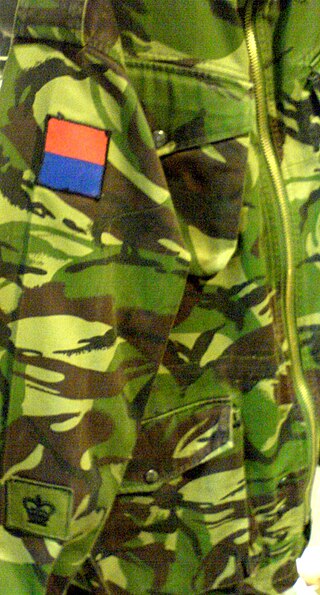
Tactical recognition flash (TRF) is the British military term for a coloured patch worn on the right arm of combat clothing by members of the British Army, Royal Navy and Royal Air Force. A TRF serves to quickly identify the regiment or corps of the wearer, in the absence of a cap badge. It is similar to, but distinct from, the DZ Flashes worn by members of Airborne Forces.
Royal Marines Cadets (SCC) are part of the Sea Cadets, a United Kingdom uniformed youth organization was formed in 1955 by the then Commandant General Royal Marines – General Sir Campbell Richard Hardy, KCB, CBE, DSO & Bar. The Royal Marines Cadets of the SCC specialise in activities such as orienteering, fieldcraft, and weapon handling.

Marine Academy Detachment is an Army Cadet Force Detachment situated within the school grounds of Marine Academy Plymouth. The Detachment is part of Devon ACF, B Company.
The Volunteer Cadet Corps (VCC) is a national youth organisation managed by the United Kingdom's Royal Navy and sponsored by the UK's Ministry of Defence. The VCC comprises:

Canadian Forces Auxiliary Vessel (CFAV) Caribou was one of ten wooden YAG-300 vessels built for the Royal Canadian Navy (RCN) between 1953 and 1955. Built for use as auxiliary craft, Caribou primarily served as an at-sea training platform for junior naval officers, boatswains, reserve personnel and Sea Cadets at Canadian Forces Base (CFB) Esquimalt.

Canadian Forces Auxiliary Vessel (CFAV) Badger (YAG-319) was one of ten wooden YAG-300 vessels built for the Royal Canadian Navy (RCN) between 1953 and 1955. Built for use as auxiliary craft, Badger primarily served as an at-sea training platform for junior naval officers, boatswains, reserve personnel and Sea Cadets at Canadian Forces Base (CFB) Esquimalt.

Canadian Forces Auxiliary Vessel (CFAV) Grizzly was one of ten wooden YAG 300 vessels built for the Royal Canadian Navy (RCN) between 1953 and 1955. Built for use as auxiliary craft, Grizzly primarily served as an at-sea training platform for junior naval officers, boatswains, reserve personnel and Sea Cadets at Canadian Forces Base (CFB) Esquimalt. Her name perpetuated the WWII armed yacht HMCS Grizzly was reused for PTC 60 GrizzlyOrca-class Patrol Craft Training (PCT) tender that replaced the YAG 300 vessels as the RCN training tenders in 2008.

Canadian Forces Auxiliary Vessel (CFAV) Cougar was one of ten wooden YAG 300 vessels built for the Royal Canadian Navy (RCN) between 1953 and 1955. Built for use as auxiliary craft, Cougar primarily served as an at-sea training platform for junior naval officers, boatswains, reserve personnel and Sea Cadets at Canadian Forces Base (CFB) Esquimalt. Her name was reused for PTC 61 CougarOrca-class Patrol Craft Training (PCT) tender that replaced the YAG 300 vessels as the RCN training tenders in 2008.











